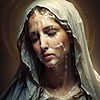HOME | DD
 GreekMythologyinAi — Hera revisit
GreekMythologyinAi — Hera revisit

#casamento #esposa #greekmythology #hera #marriage #mitologia #mitos #mythology #mythos #olympian #olympus #queen #wife #mitologiagrega #queenofthegods #aiart #stablediffusion #stablediffusionart #mitologiagregabr
Published: 2023-12-21 00:59:03 +0000 UTC; Views: 2656; Favourites: 29; Downloads: 15
Redirect to original
Description
Hera, a central figure in Greek mythology, is distinguished as the queen of the Olympian gods, reigning alongside her brother and husband, Zeus. Born to Cronus and Rhea, Hera emerged as a pivotal deity in the divine hierarchy. Her marriage to Zeus, while initially marked by resistance, became emblematic of the divine union essential for the stability of Mount Olympus.
As the goddess of marriage and family, Hera's primary domain centered around the sanctity of matrimonial bonds and the protection of married women. Her regal demeanor was complemented by symbols such as the peacock, cow, and pomegranate, with the peacock, in particular, being closely associated with her majestic presence.
The mythological narratives surrounding Hera often delve into her tumultuous relationship with Zeus. Fueled by Zeus's numerous infidelities, Hera's character is frequently defined by her vengeful nature. She relentlessly pursued retribution against Zeus's lovers and their illegitimate children, with figures like Hercules and Io facing her wrath.
Hera's maternal role is depicted through her children, Ares and Hephaestus. Ares, the god of war, embodies the martial aspects of her influence, while Hephaestus, born without a father, is the god of craftsmanship and reflects the complexities of her divine motherhood.
The goddess played a significant role in the events of the Trojan War, aligning herself with the Greeks and opposing the Trojans due to her resentment towards Paris, who chose Aphrodite over her in a beauty contest. Despite her conflicts, Hera maintained her stature as a powerful and authoritative figure, with epithets like "Queen of Heaven" and "Protector of Marriage" underscoring her multifaceted identity.
Hera's worship was manifested in temples throughout ancient Greece, with the Heraion in Argos being a notable center of her cult. Festivals like the Heraia celebrated the sacredness of marriage and contributed to her revered status among the gods.
Beyond the religious realm, Hera's character permeated various forms of art and literature. From sculptures and paintings to tragedies and epic poems, her struggles with Zeus and her role as a protective deity have left an indelible mark on classical culture.
In essence, Hera emerges as a complex and powerful goddess, embodying the ideals of marriage and family while navigating the intricate dynamics of the divine pantheon. Her stories, marked by conflicts and virtues, continue to captivate and inspire within the rich tapestry of Greek mythology.
Related content
Comments: 3

👍: 1 ⏩: 0

👍: 1 ⏩: 1

👍: 0 ⏩: 0

















